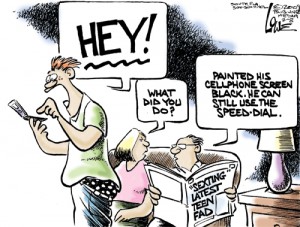Should Teens Face Felony Criminal Charges for Sexting?
 It’s the latest craze- armed with the latest, smartest camera phones, teenagers all over the country are engaged in the cyber practice known as sexting. This is where youngsters send explicit sexual messages via text or web postings accompanied by nude or semi-nude photos of themselves. The practice has raised concerns for parents, educators, and law enforcement officials alike all over the nation.
It’s the latest craze- armed with the latest, smartest camera phones, teenagers all over the country are engaged in the cyber practice known as sexting. This is where youngsters send explicit sexual messages via text or web postings accompanied by nude or semi-nude photos of themselves. The practice has raised concerns for parents, educators, and law enforcement officials alike all over the nation.
Sounds crazy? It is, and it’s even more widespread than you might think. It’s been around since about 2005 with the explosion of camera and internet phones, and recent data suggests that at least 20% of teens have engaged in sexting at some point- that’s one out of every five teenagers that you know.
Sexting is apparently the “in” thing to do these days, but most kids these days are not aware of the legal trouble that such practices can cause. In some states such as Iowa and Florida, minors have previously been facing felony charges because laws have been defining sexting as possession and distribution of child pornography. This means that both senders and recipients of sexting messages could (and already have been) charged with child pornography, even when the image was of themselves.
Most of these youths have been implicated under Federal laws such as PROTECT Act of 2003. Such laws prescribe harsh penalties such as felony charges and placement on a sex offender registry for those who possess or distribute offensive imagery such as child pornography.
But is sexting really “child pornography”? Lately, several legislators and even parents don’t think so. The harsh sentences for teens who engage in sexting have prompted a nationwide legislative response to make sentencing for sexting less severe.
Several states such as New York and Connecticut have been spearheading efforts to make sexting a misdemeanor offense rather than a felony. For example, Connecticut has introduced a bill making sexting between two consenting minors a Class A misdemeanor. The bill would not make sexting legal, but rather is intended to do away with the legal network of harsh penalties that has been making felons out of sexting minors.
The legislative efforts by states such as Connecticut have set off a chain reaction as other states are following suit. 2010 is not even halfway through yet and at least 15 states are already poised to introduce similar bills that lessen penalties for sexting. In 2009, 11 states introduced legislative acts that specifically addressed sexting. The rationale behind such legislation is that laws like the PROTECT Act were not intended to cover texting between consenting minors or teens who post nude pictures of themselves on websites such as MySpace. After all, when you think “sex-offender” or “possession of child pornography”, you don’t really think of a 14-year old girl and her latest web updates.
Some critics of the recent legislative activity think that the new bills send the wrong message, stating that such new laws seem to condone such practices and make them seem harmless. They argue that education is a better solution to the problem rather than exempting teen offenders from criminal punishment.
There is a point there. As popular as it is, sexting can lead to dangerous consequences, especially if the images do get into the hands of a “real” child abuser or sex offender. And one parent lost their child to suicide after an image of herself was mass forwarded to her schoolmates.
However, as contradictory as it seems, the crux of the debate doesn’t even have to do with whether sexting in itself is wrong, but whether children should face such harsh criminal charges for their activity. And the general consensus seems to be that children should not go to jail for sexting.
I think that one good thing about the new sexting legislation is that some of them do implement measures in educational instutions. For example, New Jersey’s bill requires that schools provide information to children in grades 6-12 on the dangers involved in sexting. Without a doubt sexting will become a central topic in sex ed class, if it already isn’t.
Sexting is not a growing problem but it’s already a full-blown epidemic in the U.S. and other countries. And it’s probably here to stay- if children’s “role models” (i.e., pop stars and movie stars) think it’s cool to post nude pictures of themselves, of course children will follow suit. But as the recent trend in legislation reflects, perhaps for the moment laws can only deal with the consequences and not the causes of sexting.

Comments
I sext and I find nothing wrong with it.